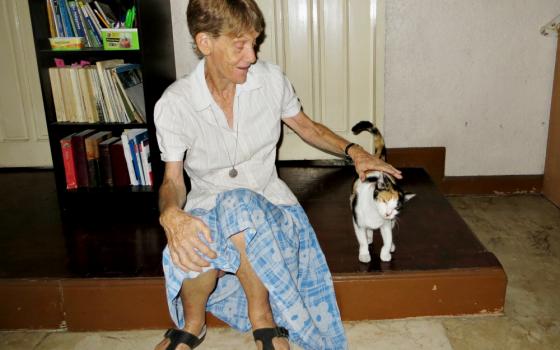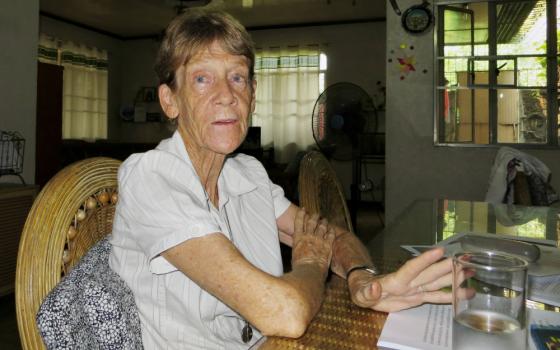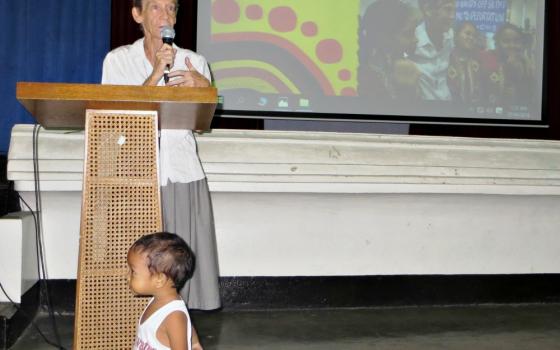After six months of uncertainty on her status as a foreign missionary in the Philippines, Sr. Patricia Fox of the Sisters of Our Lady of Sion continues to face a wall but said she hopes her appeal to stay in the country as a missionary and not as a visitor or tourist will be granted.
There are two things she has filed appeals for: the deportation issue and her 10-year visa as a missionary that requires renewal every two years. The first appeal is with the Department of Justice and the second with the Bureau of Immigration, an agency of the Department of Justice that decides whether or not to grant and/or renew a missionary visa.
Fox, 71, an Australian national and regional coordinator for the Sisters of Our Lady of Sion for the Philippines and parts of Asia, was arrested on April 16, detained for 24 hours at the Bureau of Immigration jail and given a deportation order. Officials cited her alleged political activities, particularly her participation some months before in a human rights fact-finding mission in Mindanao in southern Philippines. She was considered an "undesirable alien."
Philippine President Rodrigo Duterte publicly criticized Fox but later left it to the Department of Justice to decide her case.
Because of the deportation threat, Fox became a symbol for human rights and for women on the government's "unwanted" list, her face seen on tarpaulins, streamers, and printed and digital posters.
Fox, a lawyer by training, has been a missionary in the Philippines since 1990. She was, at one time, coordinator of the Rural Missionaries of the Philippines, which is made up of women and men religious from different congregations and, lately, of laypeople.
Fox challenged the order for her to leave on May 25 and appealed to the Department of Justice, which then allowed her to stay until June 18 while her motion for reconsideration was decided. Fox argued then that she was not given a chance to refute the charges against her. On June 18, the Department of Justice upheld her missionary visa. But she said she is aware that renewal of her visa, which was due Sept. 5, can be denied while her deportation case appeal is pending with the Department of Justice.
In an Oct. 16 interview, Fox told Global Sisters Report that the Bureau of Immigration and the Catholic Bishops' Conference of the Philippines have a 1997 memorandum of agreement that missionary visas are good for 10 years, after which they are downgraded to tourist or temporary visas renewed every two years.
Fox said while her appeal to reverse the deportation case is pending, she filed an application for a temporary visa, which would allow her to stay in the country for another two years, with the Bureau of Immigration on Oct. 13.
"It is a category no one is sure about," Fox said. "Even the Australian embassy here asked about it, but there was no answer."
With the political weather heating up because of national and local elections in May 2019, Fox's case has not been in the news lately, but she said she does not want to be complacent.
If a ruling is issued to deport her, Fox said she plans to take the case before the Court of Appeals and even to the Supreme Court. It is her visa renewal that worries her for now.
Fox's case, along with the cases of three priests who were killed in the last year, was sent to the International Peoples' Tribunal in September. The civil tribunal convicted Duterte of human rights violations, a ruling that will be forwarded to the United Nations Human Rights Council, the European Parliament, and the International Criminal Court in the Hague.
"People thought I had gone to testify. I just sent a video facilitated by the National Union of Peoples' Lawyers," Fox said.
Fox said she has avoided being seen at public rallies where religious and priests are often seen. Government agents had taken photographs of her in a rally for workers that were used against her. But Fox said she has been accepting speaking engagements in which she shares her reflections on missionary and religious life.
What if, after her appeals, she is deported or denied a visa and forced to leave?
"I will have to go back to Australia," she replied, but she said she would let it be known she is "not leaving voluntarily."
Fox said she has been amazed by the support she has received from Filipinos.
"People recognize me on the train or in the streets and they say to me, 'Don't go, don't go,' " she said.
[Ma. Ceres P. Doyo is a journalist in the Philippines. She writes features, special reports and a regular column, Human Face, for the Philippine Daily Inquirer.]



